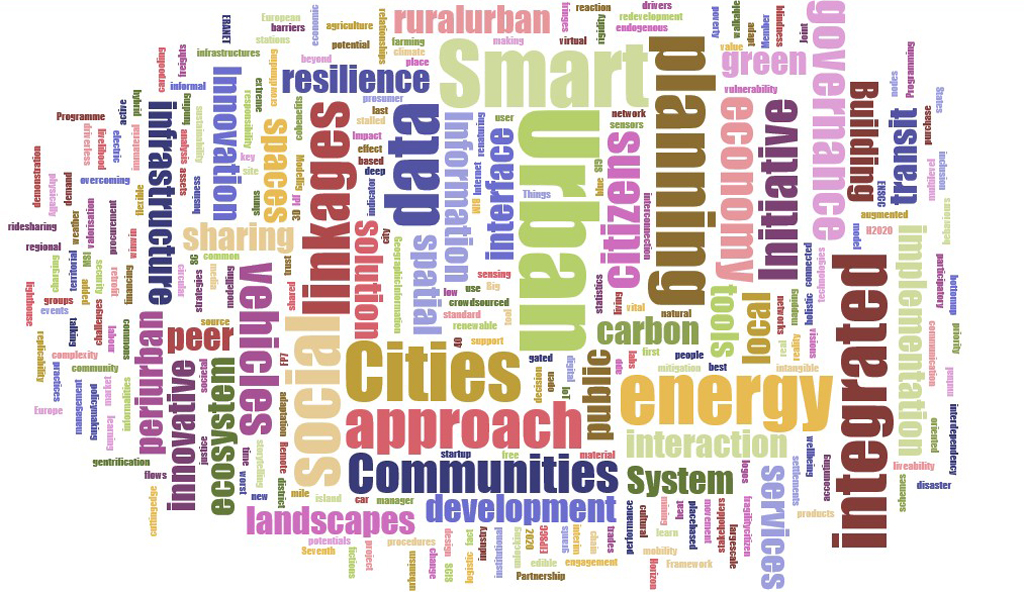Smart and sustainable planning is a complex interdisciplinary task sometimes not immediately clear to face, just as a cloudy dust of words. To orient delegations in this multifaceted world, the main theme of SSPCR 2017 – inspiring cities’ transition and innovation – is articulated into seven thematic dimensions, each investigating a specific topic during the conference days. The final aim of our effort is to provide delegates with a comprehensive overview of the field and to build up shared knowledge among researchers and professionals.

Here below the full list of thematic dimensions, specified by tags (i.e. keywords) in alphabetic order.
DIMENSION 1 – SMART PLANNING FOR ADAPTATION AND MITIGATION
TAGS: building integrated renewable energy, carbon accounting, deep energy retrofit, energy blindness in planning, extreme weather events, green infrastructure, holistic approach, low carbon development, mitigation and adaptation, multi-layered density, natural based solution, planning for disaster management, reaction to climate change, re-naturing the city, smart urban energy planning, talking energy poverty, urban ecosystem services, urban heat island effect, urban resilience, urban vulnerability
DIMENSION 2 – ICT, SPACES & SOCIETY
TAGS: 3D and augmented reality in planning, app, big data, Building Information Modelling (BIM), communication strategies, connected citizens, data mining, digital slums, Geographic Information System (GIS), Impact of technologies on people, integrated infrastructure, interconnection, Internet of Things (IoT), key performance indicator, living labs, logos and visions, mapping informalities, modelling tools, open source, real time data for planning, remote sensing, sensors, shared data, social media interaction, social networks, spatial decision support tool, standard, statistics, storytelling with data, user interface
DIMENSION 3 – NEXT ECONOMY FOR THE CITIES
TAGS: business model, circular economy, co-benefits, common spaces for the sharing economy, crowdfunding, crowdsourced design and implementation, Cultural and Creative Industries (CCI), Culture&Local developement, district manager, financing tools, flexible and interim use of stalled spaces, green public procurement, industry 4.0 and urban challenges, informal settlements, intangible and cultural assets, local labor market, prosumer, start-up, urban commons, urban ecosystem services, urban responsibility and sustainability, well-being of citizens, win-win solution
DIMENSION 4 – STRATEGIES & ACTIONS FOR GOOD GOVERNANCE
TAGS: behaviors and trust relationships, beyond gated communities, bottom-up approach, citizen’s priority first, community security, complexity, gentrification, integrated planning procedures, multilevel governance, overcoming institutional rigidity, participatory governance, place making, place-based policy-making, public engagement, social and spatial justice, social inclusion, social network and stakeholders analysis, societal fragility-citizen resilience, unlocking development potential
DIMENSION 5 – URBAN-RURAL INNOVATIVE RELATIONSHIPS
TAGS: added value chain, cultural heritage and identity, emerging energy landscape, free edible landscape, inner areas, innovative governance approach, livelihood and livability, local products purchase groups, material and immaterial flows, metropolitan cities, mutual interdependency, peri-urban farming, peri-urban interface, regional trades, rural-urban economic linkages, rural-urban interaction, smart territorial linkages, sprawl, urban agriculture, urban fringes, valorization of endogenous potentials, virtual linkages, vital linkages, social practices for clean food, water and energy uses
DIMENSION 6 – RETHINKING MOBILITY
TAGS: car sharing, carpooling, charging stations, driverless vehicles, electric vehicles, freights movement, hybrid vehicles, innovative and integrated infrastructures, last mile logistic, mobility on demand, physically active cities, ride-sharing, transit nodes, transit oriented (re)development, walkable cities
DIMENSION 7 – SMART AND SUSTAINABLE CITY IMPLEMENTATION & EDUCATION
TAGS: barriers and drivers, best and worst practices, cutting-edge smart initiative, e-learning, ERA-NET Smart Cities and Communities (ENSCC), European Innovation Partnership on Smart Cities and Communities (EIP-SCC), fact and fictions, grants and funding schemes, Horizon 2020 (H2020), implementation site, innovation, integrated approach, Joint Programming Initiative (JPI) Urban Europe, large-scale demonstration, learn and adapt, lighthouse project, peer to peer learning, replicability, RIS3 (Research & Innovation Strategies for
Smart Specialization), Seventh Framework Programme (FP7), Smart Cities Information System (SCIS), Smart Cities Member States Initiative (SC MSI), training course
